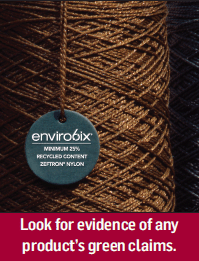Article Number: 3844
Mohawk Industries: How to become the greenwashing gatekeeper
By Frank Endrenyi, Vice president, sustainable development, Mohawk Industries
Greenwashing has been defined in many ways, but one of the best definitions comes from www.stopgreenwash.com: “The act of misleading consumers regarding the environmental practices of a company or the environmental benefits of a product or service.” The issue of confusing environmental claims is not new. In fact, the Federal Trade Commission published its first Green Guides in 1992 and revised them for the second time in 1998. So the issue of greenwashing is not new and, despite published guidelines for product claims and product labeling being in place, the consumer is still unclear about what green means.
Ultimately the responsibility for crystal-clear, environmental marketing lies with the manufacturer, but the consumer expects you to present her with straight-forward solutions to her environmental needs. So, when the reputation of your brand is also on the line, it is your duty to become a “Greenwashing Gatekeeper.” Here are the Six Sins of Greenwashing from Terrachoice Environmental Marketing of which everyone should be aware:
1. Sin of the Hidden Trade Off: Does the product focus only on one or two environmental issues while ignoring others that may also be important? Every product has multiple environmental impacts, and truly greener products try to address them all.
2. Sin of No Proof: Does the product offer evidence of its claim, either on the package or the company Web site?
3. Sin of Vagueness: What does the claim “environmentally friendly” really mean? Does it provide details for all environmental impacts of the product like the amount of packaging used, the manufacturing process and how the product is disposed?
4. Sin of Irrelevance: Are the green claims true of all products in the category? Remember lots of things are “recyclable” and CFCs (which cause ozone depletion) were banned 30 years ago.
5. Sin of Fibbing: Can it manufacturer back up certified organic or green claims? Can it prove its certification (i.e. by being listed on the certification body’s Web site)?
6. Sin of Lesser of Two Evils: Is the claim trying to make you feel green about a product category that is basically ungreen? Is organic tobacco, for example, really a green product?
As the greenwashing gatekeeper, you are selling green because you believe in green and believe it is your duty to be the advocate for your consumer and protect your brand. You know to ask your suppliers what she might not know to ask of you and you are 100% confident in the products you have on your floor. The buck stops with you and you alone.
When dissatisfaction can be sent worldwide with the touch of a keystroke, you can’t afford to not protect your business from misleading and confusing green claims. Wear your title of greenwashing gatekeeper proudly. Your customers will thank you for it.
Greenwashing has been defined in many ways, but one of the best definitions comes from www.stopgreenwash.com: “The act of misleading consumers regarding the environmental practices of a company or the environmental benefits of a product or service.” The issue of confusing environmental claims is not new. In fact, the Federal Trade Commission published its first Green Guides in 1992 and revised them for the second time in 1998. So the issue of greenwashing is not new and, despite published guidelines for product claims and product labeling being in place, the consumer is still unclear about what green means.
Ultimately the responsibility for crystal-clear, environmental marketing lies with the manufacturer, but the consumer expects you to present her with straight-forward solutions to her environmental needs. So, when the reputation of your brand is also on the line, it is your duty to become a “Greenwashing Gatekeeper.” Here are the Six Sins of Greenwashing from Terrachoice Environmental Marketing of which everyone should be aware:
1. Sin of the Hidden Trade Off: Does the product focus only on one or two environmental issues while ignoring others that may also be important? Every product has multiple environmental impacts, and truly greener products try to address them all.
2. Sin of No Proof: Does the product offer evidence of its claim, either on the package or the company Web site?
3. Sin of Vagueness: What does the claim “environmentally friendly” really mean? Does it provide details for all environmental impacts of the product like the amount of packaging used, the manufacturing process and how the product is disposed?
4. Sin of Irrelevance: Are the green claims true of all products in the category? Remember lots of things are “recyclable” and CFCs (which cause ozone depletion) were banned 30 years ago.
5. Sin of Fibbing: Can it manufacturer back up certified organic or green claims? Can it prove its certification (i.e. by being listed on the certification body’s Web site)?
6. Sin of Lesser of Two Evils: Is the claim trying to make you feel green about a product category that is basically ungreen? Is organic tobacco, for example, really a green product?
As the greenwashing gatekeeper, you are selling green because you believe in green and believe it is your duty to be the advocate for your consumer and protect your brand. You know to ask your suppliers what she might not know to ask of you and you are 100% confident in the products you have on your floor. The buck stops with you and you alone.
When dissatisfaction can be sent worldwide with the touch of a keystroke, you can’t afford to not protect your business from misleading and confusing green claims. Wear your title of greenwashing gatekeeper proudly. Your customers will thank you for it.
 |